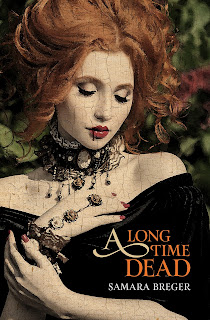1532. Santo Domingo de la Calzada.
A
young girl grows up wild and wily—her beauty is only outmatched by her
dreams of escape. But María knows she can only ever be a prize, or a
pawn, in the games played by men. When an alluring stranger offers an
alternate path, María makes a desperate choice. She vows to have no
regrets.
1827. London.
A young woman lives an
idyllic but cloistered life on her family’s estate, until a moment of
forbidden intimacy sees her shipped off to London. Charlotte’s tender
heart and seemingly impossible wishes are swept away by an invitation
from a beautiful widow—but the price of freedom is higher than she could
have imagined.
2019. Boston.
College was supposed to
be her chance to be someone new. That’s why Alice moved halfway across
the world, leaving her old life behind. But after an out-of-character
one-night stand leaves her questioning her past, her present, and her
future, Alice throws herself into the hunt for answers . . . and
revenge.
"We grow together in this garden."
V.E. Schwab's Bury Our Bones in the Midnight Soil is a somptuous tale of revenge, hunger, and female rage. Set in three different time periods, it meanders with little plot and beautiful atmospheric vibes, reading like one of the early Anne Rice novels. At its core, it's a story about what we are willing to do to survive in a world that tries to control us, a world where women are silenced. Even the latest portion, set in more recent times, shows how things might not be like in the Sixteenth Century, but women are still used and abused. And when the characters have the means to escape such a prison, it's not pretty. Schwab's vampires are full of contradictions, soft but violent, ruled by a hunger that cannot be sated.
Each of the three main characters is so completely different, in how vampirism takes and in their own needs and desires, but each of them longs for freedom. Sabine is larger than life, a creature of paroxysmal desires, made vicious by marital rape; uncaring of anything but her comfort, she lashes out and hers is a slow descent to madness, one all vampires must feel sooner or later. Charlotte lived a sheltered life, making her susceptible to the trap springing around her; she contains the most contradictions, a sweet girl whose need for warmth and connection leads to terrible acts maybe not of her doing, but maybe something that she could prevent. Alice is half formed, her past trauma revealing itself through flashbacks, now a young woman in need of direction and a new hope; of the three of them, she is the only one that can live her sexuality freely, but that doesn't mean that she's any more free. Their lives intertwine and tangle them together while they try to make sense of their new state.
Schwab draws on the mythos, taking from Rice and Stoker and Le Fanu and making new rules. The poem at the heart of the novel, the metaphor of the rose, is quite evocative and once again it reminds of Rice's Savage Garden. We see other vampires, adding to the context and showing different ways to be a vampire, perhaps some better than others. The book careens towards an explosive ending that may seem a little abrupt after the intense buildup, but it works incredibly well.
Half star off because at this level of notoriety
the author should have someone check if the sprinkled foreign language - in this case, Italian - she uses is actually correct. I also have my doubts about
seadas being served in a restaurant in Rome in the Fifties.
Bury Our Bones in the Midnight Soil is a terrific vampire novel.
✨ 4.5 stars
👩🏽🩸👩🏻🦰 So you want to read about sapphic vampires?
Click here to see what I've reviewed so far!







